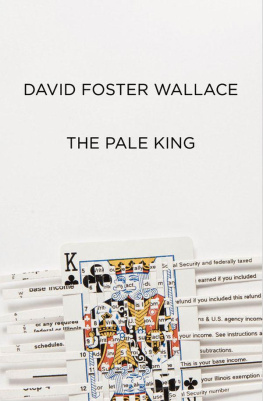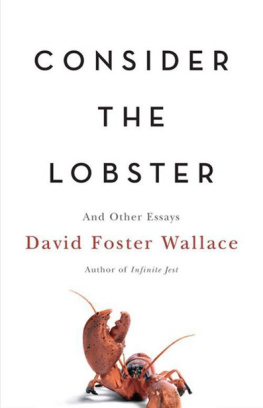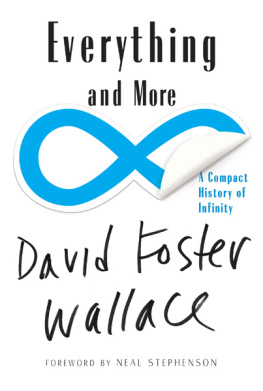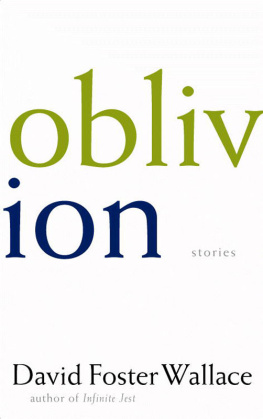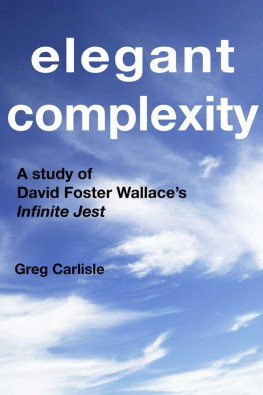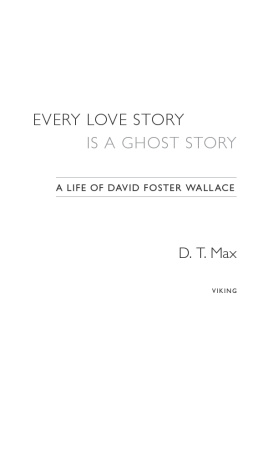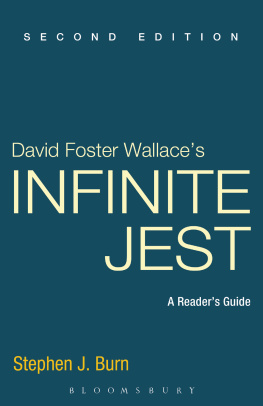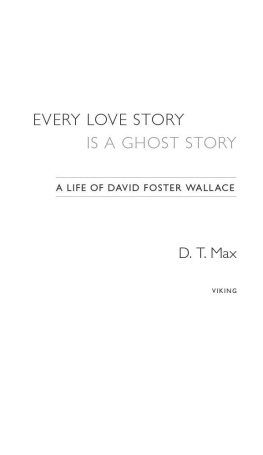David Foster Wallace - Infinite Jest
Here you can read online David Foster Wallace - Infinite Jest full text of the book (entire story) in english for free. Download pdf and epub, get meaning, cover and reviews about this ebook. year: 2006, publisher: Back Bay Books, genre: Detective and thriller. Description of the work, (preface) as well as reviews are available. Best literature library LitArk.com created for fans of good reading and offers a wide selection of genres:
Romance novel
Science fiction
Adventure
Detective
Science
History
Home and family
Prose
Art
Politics
Computer
Non-fiction
Religion
Business
Children
Humor
Choose a favorite category and find really read worthwhile books. Enjoy immersion in the world of imagination, feel the emotions of the characters or learn something new for yourself, make an fascinating discovery.

- Book:Infinite Jest
- Author:
- Publisher:Back Bay Books
- Genre:
- Year:2006
- Rating:3 / 5
- Favourites:Add to favourites
- Your mark:
- 60
- 1
- 2
- 3
- 4
- 5
Infinite Jest: summary, description and annotation
We offer to read an annotation, description, summary or preface (depends on what the author of the book "Infinite Jest" wrote himself). If you haven't found the necessary information about the book — write in the comments, we will try to find it.
Infinite Jest — read online for free the complete book (whole text) full work
Below is the text of the book, divided by pages. System saving the place of the last page read, allows you to conveniently read the book "Infinite Jest" online for free, without having to search again every time where you left off. Put a bookmark, and you can go to the page where you finished reading at any time.
Font size:
Interval:
Bookmark:
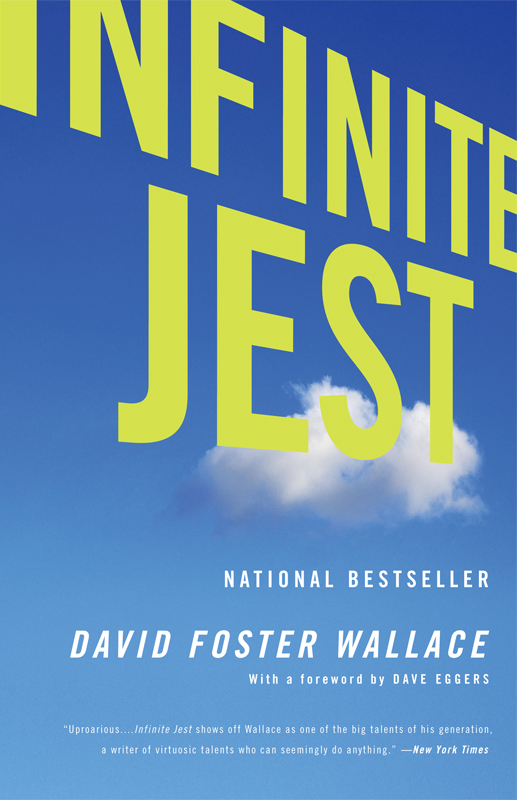
Copyright 1996 by David Foster Wallace
All rights reserved. No part of this book may be reproduced in any form or by any electronic or mechanical means, including information storage and retrieval systems, without permission in writing from the publisher, except by a reviewer who may quote brief passages in a review.
First eBook Edition: April 2009
The characters and events in this book are fictitious. Any apparent similarity to real persons is not intended by the author and is either a coincidence or the product of your own troubled imagination.
Where the names of real places, corporations, institutions, and public figures are projected onto made-up stuff, they are intended to denote only made-up stuff, not anything presently real.
Besides Closed Meetings for alcoholics only, Alcoholics Anonymous in Boston, Massachusetts also has Open Meetings, where pretty much anybody whos interested can come and listen, take notes, pester people with questions, etc. A lot of people at these Open Meetings spoke with me and were extremely patient and garrulous and generous and helpful. The best way I can think of to show my appreciation to these men and women is to decline to thank them by name.
Little, Brown and Company
Hachette Book Group
237 Park Avenue, New York, NY 10017
Visit our Web site at www.HachetteBookGroup.com.
ISBN: 978-0-316-07385-1
Also by David Foster Wallace
A SUPPOSEDLY FUN THING ILL NEVER DO AGAIN
THE BROOM OF THE SYSTEM
GIRL WITH CURIOUS HAIR
For F. P. Foster: R.I.P.
In recent years, there have been a few literary dustups how insane is it that such a thing exists in a world at war? about readability in contemporary fiction. In essence, there are some people who feel that fiction should be easy to read, that it's a popular medium that should communicate on a somewhat conversational wavelength. On the other hand, there are those who feel that fiction can be challenging, generally and thematically, and even on a sentence-by-sentence basis that it's okay if a person needs to work a bit while reading, for the rewards can be that much greater when one's mind has been exercised and thus (presumably) expanded.
Much in the way that would-be civilized debates are polarized by extreme thinkers on either side, this debate has been made to seem like an either/or proposition, that the world has room for only one kind of fiction, and that the other kind should be banned and its proponents hunted down and, why not, dismembered.
But while the polarizers have been going at it, there has existed a silent legion of readers, perhaps the majority of readers of literary fiction, who don't mind a little of both. They believe, though not too vocally, that so-called difficult books can exist next to, can even rub bindings suggestively with, more welcoming fiction. These readers might actually read both kinds of fiction themselves, sometimes in the same week. There might even be though it's impossible to prove readers who find it possible to enjoy Thomas Pynchon one day and Elmore Leonard the next. Or even: readers who can have fun with Jonathan Franzen in the morning while wrestling with William Gaddis at night.
David Foster Wallace has long straddled the worlds of difficult and not-as-difficult, with most readers agreeing that his essays are easier to read than his fiction, and his journalism most accessible of all. But while much of his work is challenging, his tone, in whatever form he's exploring, is rigorously unpretentious. A Wallace reader gets the impression of being in a room with a very talkative and brilliant uncle or cousin who, just when he's about to push it too far, to try our patience with too much detail, has the good sense to throw in a good lowbrow joke. Wallace, like many other writers who could be otherwise considered too smart for their own good Bellow comes to mind is, like Bellow, always aware of the reader, of the idea that books are essentially meant to entertain, and so almost unerringly balances his prose to suit. This had been Wallace's hallmark for years before this book, of course. He was already known as a very smart and challenging and funny and preter-naturally gifted writer when Infinite Jest was released in 1996, and thereafter his reputation included all the adjectives mentioned just now, and also this one: Holy shit.
No, that isn't an adjective in the strictest sense. But you get the idea. The book is 1,079 pages long and there is not one lazy sentence. The book is drum-tight and relentlessly smart, and though it does not wear its heart on its sleeve, it's deeply felt and incredibly moving. That it was written in three years by a writer under thirty-five is very painful to think about. So let's not think about that. The point is that it's for all these reasons acclaimed, daunting, not-lazy, drum-tight, very funny (we didn't mention that yet but yes) that you picked up this book. Now the question is this: Will you actually read it?
In commissioning this foreword, the publisher wanted a very brief and breezy essay that might convince a new reader of Infinite Jest that the book is approachable, effortless even a barrel of monkeys' worth of fun to read. Well. It's easy to agree with the former, more difficult to advocate the latter. The book is approachable, yes, because it doesn't include complex scientific or historical content, nor does it require any particular expertise or erudition. As verbose as it is, and as long as it is, it never wants to punish you for some knowledge you lack, nor does it want to send you to the dictionary every few pages. And yet, while it uses a familiar enough vocabulary, make no mistake that Infinite Jest is something other. That is, it bears little resemblance to anything before it, and comparisons to anything since are desperate and hollow. It appeared in 1996, sui generis, very different from virtually anything before it. It defied categorization and thwarted efforts to take it apart and explain it.
It's possible, with most contemporary novels, for astute readers, if they are wont, to break it down into its parts, to take it apart as one would a car or Ikea shelving unit. That is, let's say a reader is a sort of mechanic. And let's say this particular reader-mechanic has worked on lots of books, and after a few hundred contemporary novels, the mechanic feels like he can take apart just about any book and put it back together again. That is, the mechanic recognizes the components of modern fiction and can say, for example, I've seen this part before, so I know why it's there and what it does. And this one, too I recognize it. This part connects to this and performs this function. This one usually goes here, and does that. All of this is familiar enough. That's no knock on the contemporary fiction that is recognizable and breakdownable. This includes about 98 percent of the fiction we know and love.
But this is not possible with Infinite Jest. This book is like a spaceship with no recognizable components, no rivets or bolts, no entry points, no way to take it apart. It is very shiny, and it has no discernible flaws. If you could somehow smash it into smaller pieces, there would certainly be no way to put it back together again. It simply is. Page by page, line by line, it is probably the strangest, most distinctive, and most involved work of fiction by an American in the last twenty years. At no time while reading Infinite Jest are you are unaware that this is a work of complete obsession, of a stretching of the mind of a young writer to the point of, we assume, near madness.
Font size:
Interval:
Bookmark:
Similar books «Infinite Jest»
Look at similar books to Infinite Jest. We have selected literature similar in name and meaning in the hope of providing readers with more options to find new, interesting, not yet read works.
Discussion, reviews of the book Infinite Jest and just readers' own opinions. Leave your comments, write what you think about the work, its meaning or the main characters. Specify what exactly you liked and what you didn't like, and why you think so.

